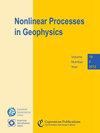Control simulation experiments of extreme events with the Lorenz-96 model
IF 2.4
4区 地球科学
Q3 GEOSCIENCES, MULTIDISCIPLINARY
引用次数: 1
Abstract
Abstract. The control simulation experiment (CSE) is a recently developed approach to investigate the controllability of dynamical systems, extending the well-known observing system simulation experiment (OSSE) in meteorology. For effective control of chaotic dynamical systems, it is essential to exploit the high sensitivity to initial conditions for dragging a system away from an undesired regime by applying minimal perturbations. In this study, we design a CSE for reducing the number of extreme events in the Lorenz-96 model. The 40 variables of this model represent idealized meteorological quantities evenly distributed on a latitude circle. The reduction of occurrence of extreme events over 100-year runs of the model is discussed as a function of the parameters of the CSE: the ensemble forecast length for detecting extreme events in advance, the magnitude and localization of the perturbations, and the quality and coverage of the observations. The design of the CSE is aimed at reducing weather extremes when applied to more realistic weather prediction models.Lorenz-96模型对极端事件的控制模拟实验
摘要控制模拟实验(CSE)是近年来发展起来的一种研究动力系统可控性的方法,扩展了气象学中著名的观测系统模拟实验(OSSE)。为了有效控制混沌动力系统,必须利用对初始条件的高灵敏度,通过施加最小扰动将系统从不期望的状态拖走。在这项研究中,我们设计了一个CSE来减少Lorenz-96模型中的极端事件数量。该模型的40个变量代表了均匀分布在纬度圈上的理想气象量。在该模型的100年运行中,极端事件发生率的减少被讨论为CSE参数的函数:提前检测极端事件的集合预测长度、扰动的大小和定位,以及观测的质量和覆盖范围。CSE的设计目的是在应用于更现实的天气预测模型时减少极端天气。
本文章由计算机程序翻译,如有差异,请以英文原文为准。
求助全文
约1分钟内获得全文
求助全文
来源期刊

Nonlinear Processes in Geophysics
地学-地球化学与地球物理
CiteScore
4.00
自引率
0.00%
发文量
21
审稿时长
6-12 weeks
期刊介绍:
Nonlinear Processes in Geophysics (NPG) is an international, inter-/trans-disciplinary, non-profit journal devoted to breaking the deadlocks often faced by standard approaches in Earth and space sciences. It therefore solicits disruptive and innovative concepts and methodologies, as well as original applications of these to address the ubiquitous complexity in geoscience systems, and in interacting social and biological systems. Such systems are nonlinear, with responses strongly non-proportional to perturbations, and show an associated extreme variability across scales.
 求助内容:
求助内容: 应助结果提醒方式:
应助结果提醒方式:


